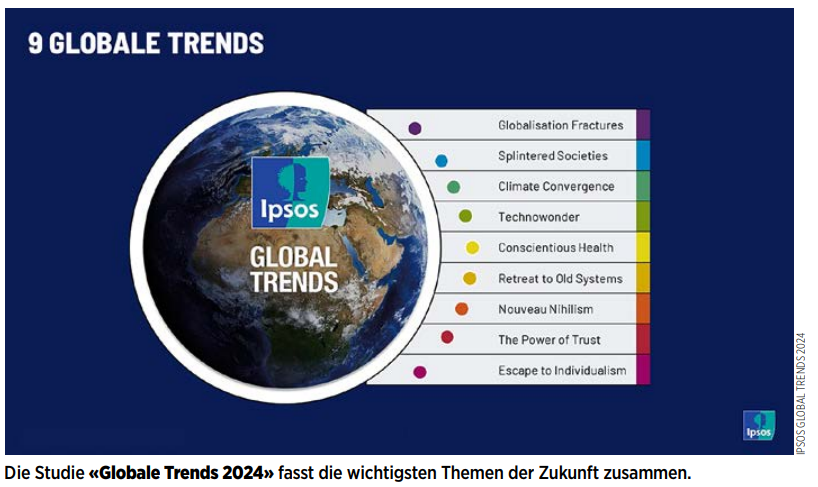The Forces Reshaping the World's Attitudes: Navigating Uncertainty in Switzerland and Beyond
As crises continue to shape the world, it is vital for Swiss business leaders to grasp the changing global attitudes.
Insights from the Ipsos Global Trends 2024 survey, covering 50 markets and over 50,000 respondents, identify major trends affecting strategic decisions.
Consumers now demand trustworthy brands, holistic health approaches, and value personal autonomy. Swiss leaders must adapt to these changes, build trust, and connect meaningfully with consumers to stay relevant.
Below is the full article as published in Handelszeitung:
The Forces Reshaping the World's Attitudes: Navigating Uncertainty in Switzerland and Beyond
In an era marked by mounting crises and pervasive uncertainty, understanding the forces reshaping global attitudes has never been more critical for Swiss business leaders. Ipsos' Global Trends 2024 survey, an ambitious undertaking spanning 50 markets and engaging over 50,000 respondents, offers an unparalleled look at the tectonic shifts underway in people's values and beliefs. For organizations in Switzerland and around the world, the implications are profound.
The data reveals a world rife with tensions and dichotomies. We are excited by technology, yet believe the world is changing too fast. We are more environmentally aware, yet simultaneously more fatalistic. Nostalgia is on the rise, even as we become more open-minded. Globalism coexists with growing introspection. And while we remain optimistic about our individual futures, we are increasingly pessimistic about the world's trajectory. These conflicting attitudes underscore the complexity of the landscape businesses must now navigate.
In the midst the tumult, several key trends emerge that will undoubtedly impact strategic decision making across industries. In the following section I want to focus on four out of the nine global trends.

The Power of Trust: Authenticity Reigns Supreme
In a world awash with information and disinformation, consumers are yearning for brands they can believe in. Authentic, values-driven messaging is no longer a nice-to-have but a must-have, particularly for younger generations. An impressive 61% of Swiss consumers say they try to buy from brands that act responsibly, even if it means spending more.
However, walking the talk is paramount - inconsistencies between words and actions can rapidly erode hard-won trust, whilst ensuring a tone of voice and topic consistent with existing brand equity is critical for effectiveness and authenticity. With the meteoric rise of AI adding a new layer of complexity, developing robust frameworks for transparent and ethical deployment will be essential to maintaining consumer confidence.
Conscientious Health: A Holistic Approach Takes Hold
The definition of health is evolving, expanding beyond mere physical well-being to encompass mental wellness and the aspiration to not just live longer, but live better. People are increasingly taking health matters into their own hands, empowered by technological advances, such as smartwatches and the explosion of health information via the internet. A remarkable 60% of Swiss consumers say they seek out health information independently rather than solely relying on their doctor.
This shift is reverberating across sectors, from the growing demand for healthier, more transparent food options to the reimagining of insurance models. Mental health, once stigmatized, is now openly discussed and prioritized, especially by Gen Z. For businesses in many sectors, supporting consumers in their proactive health journeys will be key to building lasting bonds.
Escape to Individualism & Nouveau Nihilism: The Paradoxes of Personal Autonomy
As traditional milestones collide with stark financial realities, a YOLO (You Only Live Once) mindset is taking hold, with 66% of Swiss saying they live for today because tomorrow is uncertain. Turning inward, people are focusing on the one domain they can control - themselves. Personal autonomy has emerged as the most potent value in Ipsos' analysis.
Yet individualism manifests in paradoxical ways. For some, it means embracing simplicity and slowing down; for others, it's about achievement and status-seeking. Understanding and catering to these nuanced motivations will be critical for brands hoping to connect with consumers on a deeper level.
Perhaps surprisingly, the Swiss rank among the most hedonistic globally, second only to the French in prioritizing pleasure in the present when comparing Swiss with its neighbouring countries. Campaigns that capture the zeitgeist strike a chord in this environment. Yet a one-size-fits-all approach to individualism is doomed to fall flat; empathy and personalisation are essential.
Charting a Course Forward: Implications for Swiss Leaders
For business leaders in Switzerland and worldwide, the road ahead is laden with both challenges and opportunities. Thriving in this landscape will require a deep understanding of the attitudinal currents reshaping consumer priorities and a willingness to adapt strategies accordingly.
CMOs and CEOs, in particular, will need to grapple with tough questions: What role should our brand play in this evolving ecosystem? How do we build trust through authentic action and communication? Which consumer segments should we focus on engaging, and how can we meaningfully cater to their unique aspirations?
Ultimately those who best understand these attitudinal shifts will thrive in these times of uncertainty, whilst at the same time future-proofing their organizations to tomorrows consumers landscape.
Source: https://www.handelszeitung.ch/specials/marketing-2024/navigieren-in-unsicheren-zeiten-761715




